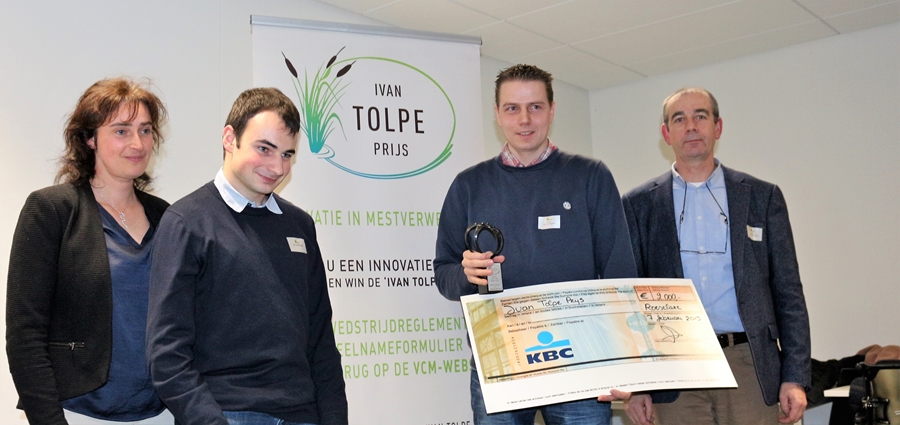- Home
-
Manure processing
-
Manure processing in Flanders
- State of affairs
- Techniques and end products
- Ivan Tolpe Prijs - Manure Processing Innovation Award
- Transition in manure processing
- Publications
- ManuResource conference
-
Manure processing in Flanders
- ManuResource
- Projects
- News
- Organisation
- Contact
- State of affairs
- Techniques and end products
- Ivan Tolpe Prijs - Manure Processing Innovation Award
Ivan Tolpe Prijs 2019
In the third edition of the Ivan Tolpe Prijs (2019), VCM looked again for innovative ideas dealing with a demand-driven problem from the sector. Just like in the previous editions, also proposals from outside Flanders were welcome, if the concept was applicable in the Flemish context.
The goal of Ivan Tolpe Award is to develop and support innovative, promising techniques and this way guarantee the leading role of manure processing in Flanders in European context.
5 project proposals were received from Flanders, The Netherlands, Israel, Italy and Denmark. The jury of experts chose from these contestants 3 nominees: NPirriK (Flanders, Belgium), From manure to animal feed (The Netherlands) and TAYA-AV (Israel). Het members of VCM have voted NPirriK as the winner.
NPirriK
Arbio BVBA co-digests yearly 90.000 ton manure (60%) with organic biological waste (40%), resulting in biogas and digestate. The digestate is treated in a biological nitrification-denitrification installation, producing environmentally save nitrogen gas (N2) and a salty liquid called “effluent” with low nitrogen levels.
With the NPirriK concept, Arbio introduces a new cascade of treatment steps on the digestate, extracting water from the digestate with minimal losses of nitrogen.
By means of a belt press with bio-degradable flocculants, a liquid fraction (80%) and a solid fraction (20%) is obtained. This solid fraction contains the largest amount of organic matter and phosphorus. It is dried and pressed into fertiliser pellets.
The liquid fraction of the digestate contains the largest share of the nitrogen and salts (mainly potassium) and has a low organic matter content. The liquid fraction is treated in subsequently a decantation tank and self-cleaning filters, before it is sent to a reverse osmosis unit, which consumes three times less energy than the biological nitrogen removal.
The reverse osmosis produces a nitrogen-rich and salty concentrate and a permeate which is poor in salts and organic matter.
The concentrate would, because of strict nutrient application limits for N and P be difficult to apply on land. But it is now mixed with the phosphorus rich solid fraction before drying, resulting in fertiliser pellets with a significantly higher N/P ratio (3 to 4 times higher than if it would not be mixed). This way the fertiliser pellets comply better with the application limits in Flanders and the demand of farmers.
Because the permeate has low salt levels, it can be used as irrigation water for the surrounding arable land.
Npirrik applied in 2017 with success for the Flemish call for subsidies for circular economy projects “Vlaanderen Circulair”. This call aimed for demonstration and dissemination projects and it granted NPirriK with 100.000 € to realize the project. The technologies (belt press, reversed osmosis) were bought and installed at Arbio and are currently starting up. They are expected to be fully operational by the end of 2019.
In their vision note, VCM describes a way to strive for a prudent way to process the Flemish manure surplus, in a way that a balanced use nutrients in agriculture stays possible.
A transition in the sector of manure processing towards circular economy, including nutrient recovery, can ensure that manure gets valorised. Only if this happens, the pressure to apply manure on land will decrease in a sustainable way. The NPirriK project completely covers this vision, because the products resulting from the digestate treatment are produced locally from manure and bio-waste and valuable resources (nutrients and organic matter) and water are locally recycled and re-used.
3 nominees
The two other nominees for the third edition of the Ivan Tolpe award were Elsinga Beleidsplanning & Innovatie and Triple T.
The Dutch application of Elsinga Beleidsplanning & Innovatie looked for a practical process to safely recycle manure to (resources for) animal feed.
By means of a controlled process involving high pressurised steam (± 40Bar) and temperature (± 250 °C) would sterilize all pathogenic germs and break down ca. 94% of all present animal medication.
The Israeli application TAYA-AV of the company Triple T, is designed to treat digestate of liquid fraction of manure met a high organic and nitrogen content by means of biological nitrification-denitrification.
In this technology 2 basins are filled alternately, hereby exposing the bacteria to anoxic (denitrification) and aerobic (nitrification and COD removal) conditions. The design of the TAYA requires a low energy demand (0,9kWh/kg-N) and because the bacteria are growing on a carrier system, a better separation of the activated sludge an the effluent is obtained.
The ‘Ivan Tolpe award 2019’ was handed to Tim Keysers on the7th of February 2019. By this awarding him, VCM wants to stress the importance of such developments and hopes to see these ambitious realisations appear in the market!

- State of affairs
- Techniques and end products
- Ivan Tolpe Prijs - Manure Processing Innovation Award